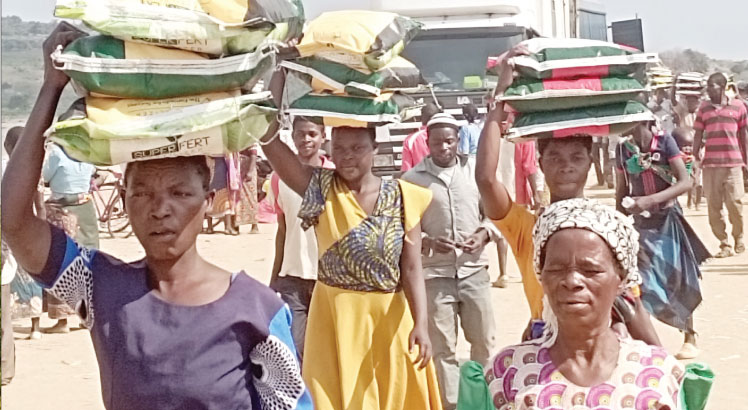Just three weeks before Esther Wedson, 40, harvested her maize, Cyclone Freddy triggered landslides from Mulanje Mountain that buried her crop in mud and rocks.
The mother of six in Makokola Village, Traditional Authority (T/A) Njema in Mulanje District, expected to harvest 40 bags from the two-acre field.
“By March 9 2023, my maize was matured,” she says, shaking her head. “Only to be buried in mud from the mountain four days later.”
The destruction of vast croplands epitomised the loss caused by the devastating tropical storm which affected 2.2 million people across the Southern Region.
“I was shattered to see rocks and sand all over my maize field. I had toiled in vain. My fertiliser worth K186 000 was gone,” she says.
Some of the Cyclone Freddy survivors walk home with fertiliser
Wedson’s family of eight escaped with only the clothes they were wearing when the disaster struck.
Agnes Valiya, 65, says she has never seen a worse disaster than the mudslide that swept away everything in their way.
“Our houses crumbled within a blink of an eye. The mudslides swept friends and relatives to the grave,” she says.
Valiya lost three bags of maize, goats, chickens and pigs.
The mudslides triggered by relentless torrents also buried her one-acre maize field in silt.
According to the Department of Disaster Management Affairs (Dodma), Cyclone Freddy destroyed more than 28 164 hectares of maize belonging to 509 244 households.
The disaster left more than 659 278 people displaced, 679 confirmed dead and 537 still missing, Dodma assessments show.
World Vision Malawi (WVM) provided food aid and other relief items to the survivors in T/A Njema to alleviate their suffering.
The faith-based non-governmental organisation is also supporting these survivors and 3 000 others in Phalombe, Nsanje, Neno, Chiradzulu and Machinga districts to meet their immediate needs and rebuild their lives.
WVM also distributed maize and bean seed as well as fertiliser with funding from World Vision US and Taiwan.
Group Village Head Msikita is happy that many households that lost their crops have replanted to take advantage of the abundant moisture and fertile soils left by the floods.
“It is two weeks now and the crops have sprouted well in the dambos along the border with Mozambique. The fertiliser will help our irrigated crops thrive,” he says.
Wedson hopes to harvest more than the 40 bags he used to get from his two-acre field.
“The new crop gives me a second chance to replenish my food basket as hunger and grain prices are on the rise,” he says.
Valiya commends WVM for supporting the rural community during the tough times.
The mother of five says: “World Vision ensured that we have food, safe water and shelter. The second crop will help us recover from the disaster and become self-reliant again.”
WVM humanitarian emergency affairs manager Sobhuza Sibande says the organisation is committed to protecting the well-being of vulnerable communities, especially childeren.
He says: “We are providing relief items as part of short-term and long-term measures to promote sanitation and hygiene, food security and nutrition of the affected people to alleviate poverty.”
The post Cyclone survivors plant again appeared first on The Nation Online.
 Moni Malawi
Moni Malawi 
